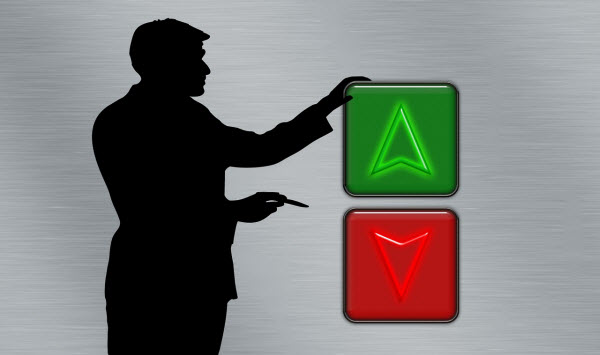Dr. Mort Orman here and this week, I’ve been explaining how it can be helpful, in terms of challenging your beliefs and reducing your stress, to think of your mind as an elevator. In my first article, I talked about the “elevator” starting on the Main Floor, where most of our conscious opinions and beliefs reside. Then, in Part 2, I talked about “getting into your mind elevator” and going down one level to where our deeper core philosophies can be found. Today, in the third and final part of this series (Your Mind As An Elevator Part 3) I’m going to take you all the way down to the ground floor—where our deepest layer of thoughts exist.
Your Mind As An Elevator Part 3: What’s On The Ground Floor?
Beneath your deeper core philosophies lies another even deeper level of beliefs, which most of us never visit and few of us ever have the courage to challenge.
This is the level of our very deepest presuppositions.
Presuppositions are even deeper (and more powerful) than our strongest core philosophies.
In fact, they are so deep that we rarely ever notice them…much less call them into question.
What Are Presuppositions?
Presuppositions are things we believe that most people just take for granted.
They are simply assumed to be true—so much so that you would risk being labeled a fool should you ever dare to question them.
For example, we all have a basic presupposition that we are alive. We also have the presupposition that world around us really exists.
It would seem foolish to challenge either of these two propositions—and that’s exactly the feeling we get whenever we run up against a deep level presupposition that everyone would be reluctant to question.
But not all presuppositions are actually true (like the two above, which would indeed be difficult to contradict).
For example, you could have the presupposition that the good things in life are scarce and therefore are in limited supply…or you could have the opposite presupposition that most of the good things in life are abundant and readily available to everyone. [This is the scarcity .vs abundance dichotomy.]
Both of these presuppositions cannot be simultaneously true.
As it turns out, about 80% of living adults have a basic scarcity orientation towards the world.
About 20% are more fortunate and have an abundance mentality, which I believe is more consistent with the truth about reality.
But if you are stuck with a powerful scarcity viewpoint, perhaps one that gets “implanted” into you at a very early age, most of your deep core beliefs (Lower Level 1) and even your conscious beliefs (Main Floor) will have a scarcity bent to them, and you won’t even know where this comes from, much less that your related scarcity perspectives and beliefs aren’t really true.
And should anyone (including yourself) begin to question one of your erroneous higher level beliefs—like money is scarce, love is scarce, true friendships are scarce, happiness is scarce—you won’t be able to “change” these beliefs if you continue to maintain your Ground Floor level (more global) presupposition about scarcity, which is what most people are prone to do.
What Are Your Presuppositions About Stress?
Similarly, most people today have very inaccurate (but deeply ingrained at the Ground Floor level) presuppositions about stress.
For example most people just take it for granted that stress exists and that human beings frequently suffer from stress.
I, on the other hand, have been teaching for years that neither of these two prevailing assumptions is actually true.
Most people believe that stress can sometimes be good or healthy for them, and this is another false but widely accepted notion that also comes from deeper Ground Floor level misconceptions about what stress really is…and what it is not.
So unless you uncover and begin to challenge your deeply held presuppositions about stress—meaning most of the things that you’ve been taught to assume are true about it—it is doubtful you will ever have a major breakthrough in your ability to free yourself from stress (which by the way is another presupposition many people have that being mostly free of stress in or modern world isn’t really possible).
The Power Of Correcting A False Presupposition
While it may be very difficult to change or let go of a strongly-held conscious belief or even to modify an even more deeply-held core philosophy (because deeper level presuppositions keep holding these in place), once you decide to challenge and change one of your basic presuppositions about life…all sorts of faulty higher level beliefs will rapidly begin to change.
This is because they no longer are consistent with your new way of understanding the world around you.
This is the path I followed, in my own life, to eliminate most of my own personal and professional stress, which I struggled with unsuccessfully for more than 30 years.
It wasn’t until I had the courage to realize that some of my deepest held presuppositions about stress (and about several other key areas of life) were entirely wrong—even though almost everyone around me believed in them and defended them to the hilt—that I was finally able to free myself from these recurring life problems, when I had completely lacked the ability to do this while I was trapped inside my previous distorted worldview.
And this is also how I’ve been able to help hundreds and thousands of other people to significantly reduce their stress, when nothing they’d been trying for years had made any lasting difference.
You just have to get into your “mental elevator” and go down two floors.
And when you arrive at the Ground Floor, simply open up your eyes and look around with a strong intention to separate truth from fiction.
Oh, and by the way—there are no “up” or “down” buttons to push in your personal “mental elevator.”
You simply move up and down by having the will and the courage to do so.
To your health, happiness and success,
Dr. Mort Orman, M.D., International Speaker, Author And Founder Of The Stress Mastery Academy | http://DocOrman.com


